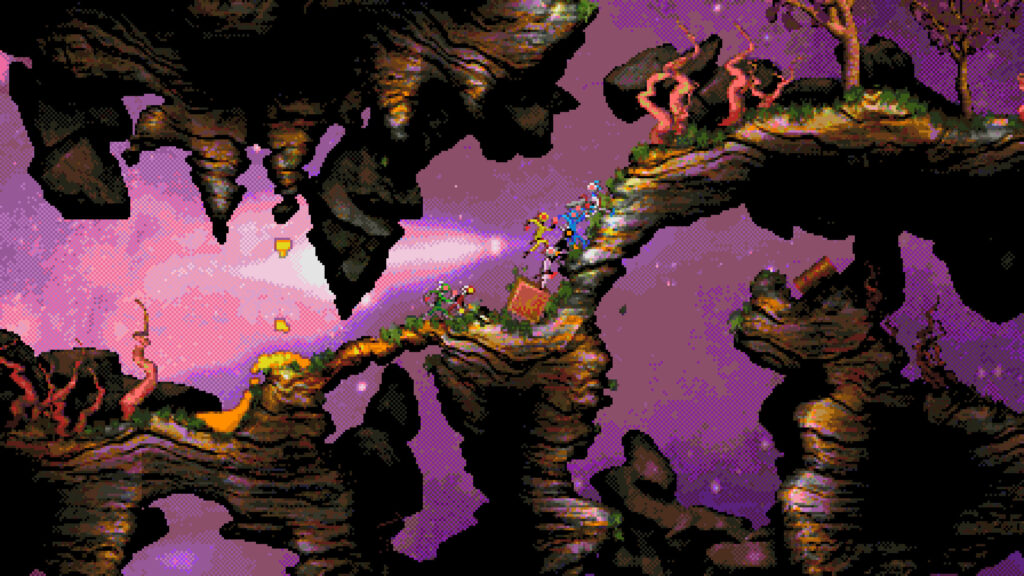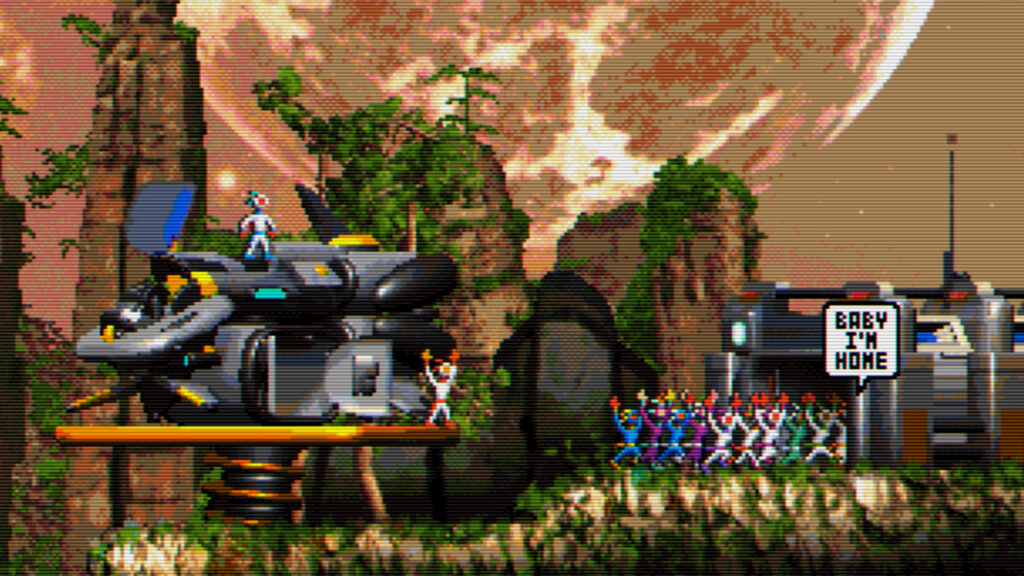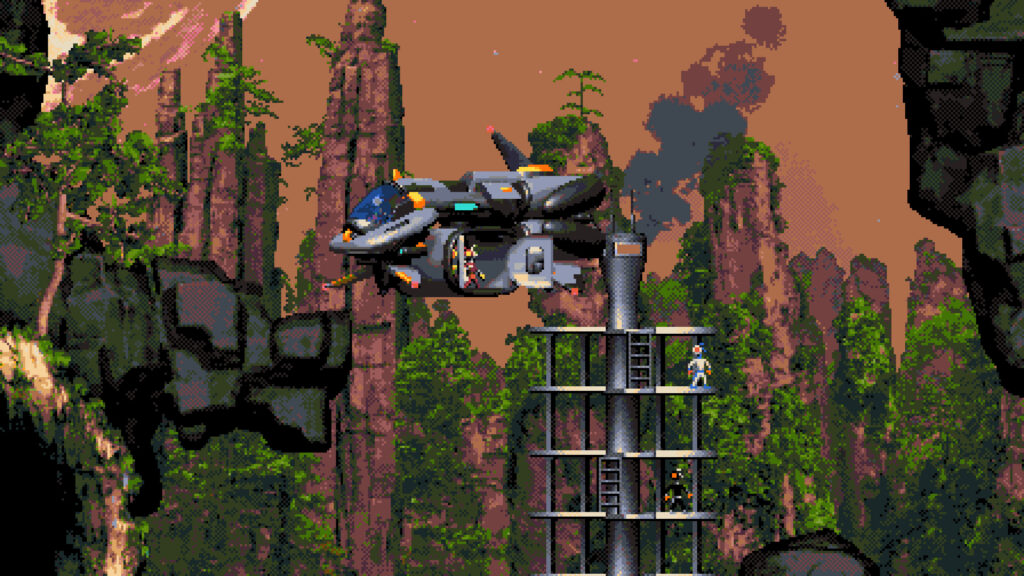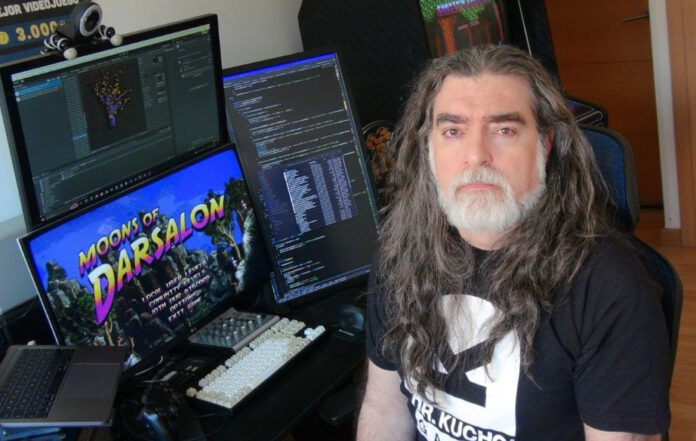Spanish solo dev Daniel Manzano (aka Dr. Kucho!) likes working alone. He calls himself ‘very persistent and solitary’ and he won’t stop until he reaches the desired end result. But the 8 years it took to create Moons of Darsalon really took a toll on him. “The first four years were almost absolute happiness. I enjoyed what I was doing very much. The last four years were hell.” Manzano endured the rough times though and managed to finish the game and release it on Steam.
The games he finds on Steam nowadays are hardly worthy of the term video game according to Manzano. “The modern gaming ecosystem is killing true video games”, he says earnestly. “Players don’t want a video game, they want a simulation of a video game. Something that seems to offer a challenge, but is actually a perfectly balanced system so that no one ever feels frustrated. For me, these are not games, they are guided tours!” Suffice to say that Moons of Darsalon offers a true challenge as you guide groups of Lemmings-like darsanauts off alien-infested mining moons.
Why did you become a solo developer?
“I have always worked alone. I enjoy learning and seeing myself capable of overcoming challenges. The only problem with working alone in video games is that the level of work is multiplied by 10,000 compared to other things I have done before.”
What are the biggest advantages of working solo?
“Working alone, you don’t argue with anyone and no one bothers you insisting with random ideas that they think are better simply because they are theirs. Which is only avoided with a well-defined hierarchy of power and/or competencies that not everyone in the indie world is willing to assume. Anyway, I don’t think anyone would be willing to stay on a project with me for too long because I don’t care if the time and/or effort spent on a task will be profitable. I only care about the result.”
And the biggest pitfalls?
“Weariness, loneliness, depression, questioning what you are doing with your life… those kinds of things.”

What’s your creative process?
“I had no idea what I was doing with Moons of Darsalon. The only thing I was clear about was that I wanted the character to be very small and with very fluid animations. The size gives the advantage that you can see much more terrain, so the action is much more interesting. The rest of the things were emerging on their own. As I was trying the builds, the game itself was telling me what things would be interesting to add, so I added them. After some tests, some worked and others didn’t.”
How did you stay motivated through the 8 years of development?
“The first four years were almost absolute happiness, with some low moments but nothing serious. I enjoyed what I was doing very much. The last four years were hell. That I didn’t quit it was because I had a lot of work done already and had to finish it no matter what. There was no other option. I’m not the type to give up.”
Will you ever work in a team or is it only solo for you?
“I’m starting to work with a writer on a sequel to Moons of Darsalon and I’m already fearing the fights we’re going to have haha!”
How much did the project and your way of working change in the 8 years it took to build Moons of Darsalon?
“I don’t know. I suppose many things changed, but being so gradual and reaching a point where I was just trying to see the light at the end of the tunnel, I don’t think I could have realized much in this aspect.”

What’s the biggest lesson learned from this project?
“I’ll give you three:
- Absolutely no one, including publishers, has any idea if a video game is going to work.
- Our success doesn’t depend on how good the game is, it depends on many things, but a very important and often forgotten one is your following, and following is not built suddenly, it’s worth building a following from the bottom up, with catchy but small games, and from there upwards.
- The modern gaming ecosystem is killing true video games. To me, a video game should offer a challenge, something that you would want to replay to see how your skills are improving. Actually the fun of playing video games is right there. But the modern gaming ecosystem is creating a very large group of players who see these aspects as negative. If they fall off a cliff, they want a checkpoint at the top of the cliff; if an enemy shoots a bullet and they do absolutely nothing to avoid the bullet, they complain about the difficulty; If they have to repeat a level because they died due to playing without any caution or care, they exclaim “Do I have to repeat everything now!?”. Basically, these players don’t want a video game, they want a simulation of a video game, something that SEEMS to offer a challenge, but is actually a perfectly balanced system so that no one ever feels frustrated while at the same time no one takes any risks and there is no penalty for playing poorly. For me, these are not games, they are GUIDED TOURS, it’s something similar to the ‘Ego tour’ offered by the company Memory Call in the movie Total Recall, it seems like an adventure but it always goes well, therefore, it’s not an adventure. The review system on Steam, and the fear that developers have of negative reviews, is favoring the increasing number of games of this type, and the increasing number of games of this type is melting away the little courage that gamers of today may still have. And the worst part is that they are completely convinced. I don’t know when they became video game experts (watching movies does not makes you James Cameron), but since the rest of the games they play are extremely accommodating, when the game penalizes them, they don’t think they did something wrong, THE GAME IS WRONG!, and it’s not up for debate, it’s wrong, end of story.”

The toll on your mental health can be quite high as a solo developer. How do you deal with that?
“I am very persistent and solitary, so I think the impact on mental health was not as bad as it could have been for other solo developers in a project like this. But even so, I have noticed it. In the last four years, I was in a very bad place. Fortunately, as I saw the light at the end of the tunnel, I regained the will to live, but it was very tough. I don’t think many people can endure that level of work, especially when you learn more about the video game business and realize that it’s not going to compensate financially.”

